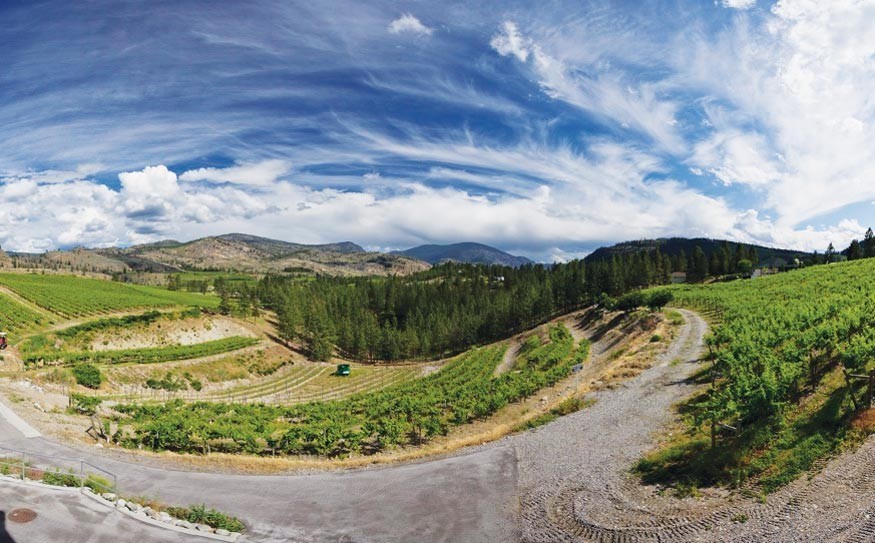Dwight Sick, winemaker at Stag's Hollow Winery and Vineyard, in the dry hills just south of Okanagan Falls, displays a quiet pride in his product — and rightly so.
The small South Okanagan operation — 12 years old and producing 7,500 cases — has been racking up the awards at Canadian and Pacific Northwest wine competitions, and was recently named "B.C. Winery of the Year" by Wine Press Northwest Magazine in the U.S.
Sick attributes the success of his wines in part to the vineyard's tough glacial till. "It's essentially a gravel pit," he says. "The roots of our plants work hard. They go way deep — and hard work makes good wines."
My companions and I tasted Stag's Hollow's signature merlot and pinot noir, both with strong hints of blackberry and plum. And given the quality of what are apparently vintages well matched to the rocky soil, Sick is among Okanagan vintners enthused about breaking down the entire Okanagan — north to south — into smaller "appellations" that best reflect the local growing conditions or "terroir," and the subsequent wines they produce.
Stag's Hollow, for example, would, with other wineries, fall under what Sick refers to the "geographical indicator" of Okanagan Falls. Wineries to the south may (or may not) choose a "GI" such as McIntyre Bluff — the looming outcrop north of Oliver (popular with rock climbers) to best describe the unique conditions of their grape-growing sub-region.
"It's time to determine where these lines should be drawn — and tell people exactly where the wine comes from," says Sick of Okanagan-wide discussion on how to sub-divide the region for more precise bottle labelling.
We then checked into Deerpath Lookout, a gorgeous B&B sited on pine-covered bench-land on the western shore of Skaha Lake. Owners John Archer and Doug Bertz built this adobe-style house, and then filled it with thoughtful art and knickknacks that buyer John (a former Vancouver Supreme Court reporter) collected.
Breakfasts are equally appealing — homemade granola with toasted filberts (from a hazelnut farm in Agassiz), Balkan-style yogurt and honey from the Similkameen, followed by crepe-like blueberry pancakes, accompanied with fresh fruit juices.
More importantly, Deerpath is a haven of quiet, unrecognizable birdcalls or trills, alpine grasses and myriad small creatures. A Bambi-like fawn idled outside my room window in the early morning, munching grass.
Just outside Penticton, the Naramata Bench — with 15 glorious kilometres of bluff-top road — has nurtured a mushroom patch of wineries — more than 20 at last count.
Among recent additions is the Upper Bench Estate Winery and Creamery, created with style by couple Gavin and Shana Miller. Gavin, an outgoing Brit who emigrated in his early 20s and spent more than a decade apprenticing at Okanagan wineries, is the winemaker.
He says of his newfound avocation: "A passion is what makes this work — a desire to do well and to do more. I've always worked hard. And when you find you can do something (like make good wine) you get excited and want to do better."
In wine awards announced at the "Battle of the Benches" wine-tasting event in Penticton that evening — part of the summer Okanagan wine festival — Miller took the prize for best chardonnay (2011). Miller eschews the Okanagan trend to producing what many argue are "more interesting" blended wines, made from two or more grape varieties. His explanation? He just prefers the pure varietals.
Meanwhile Shanna Miller, a consummate if novice cheese-maker, is turning out varieties that include a luscious Stilton-style soft blue "King Cole" (named for her Nova Scotian grand-parents: "The hardest part of this whole journey has been naming the cheeses — I've been in tears," she says); another semi-soft blue called "Grey Baby" and ideal with Gavin's Pinot Gris; and a salt-brined buttery brie that quickly disappeared from the delectable cheese plate.
While Gavin supports a move to sub-regional appellations — in this case the Naramata Bench — he does so, he admits, because all his grapes are grown on the bench, and he could therefore use the appellation on his bottle labels.
Neighbour Richard da Silva — an affable bear-of-a-man who, with wife Twylla, owns and operates the Misconduct Winery Co. just down the road, takes a different approach.
Raised in a wine-devoted Portuguese family in the south Okanagan, de Silva claims to know a lot about wine culture, including the advantages of growing just the right grape varietals on the most suitable sites. He therefore brings most of his grapes in from prime vineyards in the South Okanagan (yes, the small vineyard industry is a world unto itself). Da Silva is therefore not keen on local appellations.
Rather, he thinks the Okanagan would collectively produce a higher quality of wine if it paid more attention to closely matching varietals with local conditions (for example, Pinot Noir on the Naramata Bench).
And "Misconduct"? Characterizing his boyhood as mildly bad-boy, he says: "It's both tongue in cheek to our upbringing here, and our irreverent attitude to wine." De Silva believes most vintners (and consumers presumably) take the wine scene far too seriously.
Resources
www. thewinefestivals.com
www. upperbench.ca
www. misconductwineco.com




